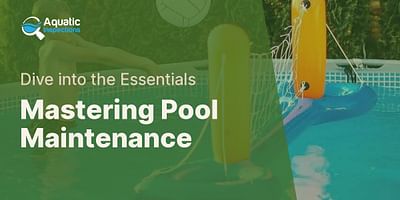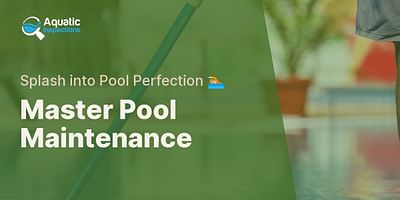Michael Diver is a former professional swimmer turned pool maintenance expert. With his extensive knowledge of water chemistry and pool equipment, he provides practical tips and advice to pool owners. Michael is dedicated to promoting safe and enjoyable swimming experiences.
Hey there! Thanks for reaching out with your question. When it comes to pools, you might be surprised to learn that there can be a variety of aquatic life that can make their way into your pool. Let's dive in and explore some of the common types of aquatic organisms you might encounter.
Common Aquatic Organisms in Pools
| Organism | Appearance | Habitat | Prevention Measures |
|---|---|---|---|
| Algae | Green, slimy substance | Thrives in sunlight and warm water | Regular pool cleaning and use of algaecides 🧹 |
| Mosquito Larvae | Small, wriggling creatures | Stagnant water | Use of mosquito dunks and keeping water circulation 🦟 |
| Water Boatmen | Small, oval-shaped bugs | Still water with algae | Regular pool cleaning and use of algaecides 🚣 |
| Backswimmers | Light-colored bugs that swim upside down | Still water with algae | Regular pool cleaning and use of algaecides 🏊 |
| Frogs | Small to medium-sized amphibians | Still water near vegetation | Use of frog log and maintaining proper pool chemistry 🐸 |
Types of Algae and Their Treatment Approaches
| Type of Algae | Appearance | Common Causes | Treatment |
|---|---|---|---|
| Green Algae | Green and cloudy water | Poor circulation, lack of sanitation | Shock treatment with chlorine, brushing, and filtration |
| Yellow or Mustard Algae | Yellow or brownish tint, often on pool walls | Poor sanitation, warm water | Super-chlorination, brushing, and algaecide |
| Black Algae | Dark black or blue-green spots, often on pool walls | Poor sanitation, rough pool surfaces | Scrubbing with stiff brush, high levels of chlorine, and algaecide |
One of the most common types of aquatic life you might find in your pool is algae. Algae are single-celled organisms that thrive in water and can cause your pool to turn green or cloudy. There are different types of algae, including green algae, yellow or mustard algae, and black algae. Each type requires a specific treatment approach, so it's important to identify the type of algae you have to effectively get rid of it.
Another type of aquatic life that can find its way into your pool is bacteria. Bacteria are microscopic organisms that can multiply rapidly in warm water. While most bacteria are harmless, some can cause health issues if they enter your body through cuts or ingestion. That's why it's crucial to maintain proper water chemistry and regularly sanitize your pool to keep bacteria levels in check.
In addition to algae and bacteria, you might also encounter small insects and invertebrates in your pool. These can include mosquitoes, water boatmen, backswimmers, and even tadpoles. While these creatures are generally harmless, they can be a nuisance and disrupt your swimming experience. Regular pool maintenance, including skimming and cleaning the pool, can help keep these critters at bay.
It's worth noting that the presence of aquatic life in your pool is not necessarily a sign of poor maintenance. Even with proper care, some organisms can find their way in through wind, rain, or even on your skin or swimsuits. However, maintaining a clean and balanced pool environment can help minimize their occurrence.
To prevent the growth of algae and bacteria, it's important to regularly test and balance your pool's water chemistry. This includes monitoring pH levels, chlorine or sanitizer levels, and alkalinity. By keeping these levels in the recommended range, you can create an environment that is less hospitable to these organisms.
In conclusion, while it's not uncommon to find various types of aquatic life in your pool, proper pool maintenance and regular inspections can help keep their numbers in check. By staying on top of water chemistry, cleaning, and sanitation, you can ensure a safe and enjoyable swimming experience for you and your family.
I hope this information helps! If you have any more questions or need further assistance, feel free to reach out. Happy swimming!















